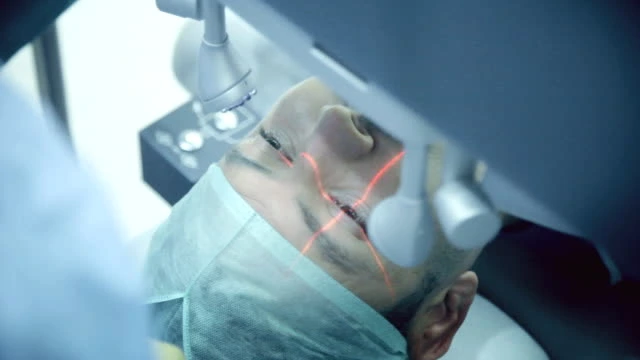Do you wish you could wake up and see clearly without reaching for your glasses? Sounds appealing, right? That’s where a laser eye surgery come in. But it’s normal to feel a bit worried. Is laser eye surgery safe? What will happen during the surgery? Could it create new problems?
With all these questions, it might seem overwhelming. But don’t worry. This article is here to help. We’ll explain everything – the risks, the benefits, and all the details. So let’s get started on this journey to clear vision together.
Contents
What is Laser Eye Surgery?
In simple terms, laser eye surgery is a procedure to correct vision problems. It involves reshaping the cornea, which is the clear front part of your eye. This is done so that light entering your eye can be properly focused, which will improve your vision.
You might be wondering how a laser can improve your vision. Well, the laser is used to remove a tiny bit of tissue from your cornea. This changes the shape of the cornea, which in turn changes how light enters your eye. The result? Corrected vision. It can fix problems like nearsightedness, farsightedness, and astigmatism.
Is Laser Eye Surgery Safe?
 You may be looking for a simple answer to the question, “Is laser eye surgery safe?” However, if you have a thorough understanding of medical processes, it will be careful of using the word ‘safe’ carelessly, especially when it comes to surgical treatments. Why? Because for many, ‘safe’ implies an absence of risk, a guarantee of problem-free results.
You may be looking for a simple answer to the question, “Is laser eye surgery safe?” However, if you have a thorough understanding of medical processes, it will be careful of using the word ‘safe’ carelessly, especially when it comes to surgical treatments. Why? Because for many, ‘safe’ implies an absence of risk, a guarantee of problem-free results.
No surgical procedure, including laser eye surgery, can offer a 100% guarantee. Each one carries its own set of risks and potential complications.
That said, it’s worth noting that laser eye surgery has a strong track record. Many people undergo this procedure and enjoy significant improvements in their vision, with minimal side effects. In fact, around 96% of people achieve 20/20 vision or better following LASIK, one of the most common types of laser eye surgery.
Moreover, it’s essential to understand that although complications are rare, they can happen. These can range from mild irritations like dry eyes or temporary visual disturbances to, in extremely rare cases, more serious complications that could impact vision.
Still, don’t let these possibilities deter you. The occurrence of such complications is infrequent, and most can be managed or corrected with additional treatment. The crucial factor here is to ensure you’re in the hands of a highly qualified and experienced surgeon, who can effectively guide you through the process and handle any complications that may arise.
Is Laser Eye Surgery Painful?
 One common concern many people have is whether laser eye surgery is painful. It’s a natural worry – after all, the idea of a laser being used on your eyes can seem a bit daunting.
One common concern many people have is whether laser eye surgery is painful. It’s a natural worry – after all, the idea of a laser being used on your eyes can seem a bit daunting.
Here’s the reassuring news: laser eye surgery is typically not painful. Before the procedure begins, your surgeon will use anesthetic eye drops to numb your eyes. This means you shouldn’t feel any pain during the surgery itself.
You might feel some pressure on your eye when the surgeon is working, but it shouldn’t be painful. Some people describe it as a feeling of discomfort rather than pain.
After the surgery, it’s normal to experience some discomfort, similar to the feeling of having an eyelash in your eye. You might also have dry eyes for a while. But these symptoms usually improve within a few days to a few weeks as your eyes heal.
Remember, everyone’s experience with laser eye surgery is unique. Your surgeon will be able to provide more detailed information based on your specific situation and comfort level.
The Risks and Complications
 Let’s explore some of the most common ones:
Let’s explore some of the most common ones:
- Dry Eyes: After laser eye surgery, you may experience dry eyes for a few weeks or months. This happens because the surgery can reduce the amount of tears your eyes produce. Your doctor might recommend using artificial tears or other treatments to manage this.
- Glare, Halos, and Double Vision: You might experience visual disturbances like glare, halos around lights, or double vision, especially in low light. These are usually temporary and resolve within a few weeks or months.
- Undercorrections or Overcorrections: Sometimes, the laser might not remove enough or might remove too much tissue from your eye, leading to undercorrection or overcorrection. If this happens, you might need a second laser surgery, also known as an enhancement.
- Rare But Serious Risks: In rare cases, laser eye surgery can lead to more serious complications like an infection in the cornea or problems with the corneal flap made during LASIK. These can usually be treated, but in very rare cases, they might lead to vision loss.
Remember, the best way to minimize these risks is to work with an experienced and qualified surgeon. They can guide you through the process and provide appropriate care and treatment if any complications arise.
Steps You Can Take For A Safe Laser Eye Surgery
Let’s discuss some of these crucial steps:
- Choose an Experienced Surgeon: One of the best ways to enhance safety is to choose a qualified, experienced surgeon. They should have extensive experience with the type of surgery you’re considering and a track record of successful outcomes.
- Undergo a Comprehensive Evaluation: Before the surgery, your surgeon should conduct a thorough evaluation of your eyes and general health. This includes understanding your vision correction needs, assessing the thickness and shape of your corneas, and checking for any existing eye conditions that might affect the surgery.
- Follow Pre-Surgery Instructions: Your surgeon will provide instructions to prepare for the surgery. This might include avoiding certain medications or not wearing contact lenses for a period of time before the surgery.
- Attend All Follow-Up Appointments: After the surgery, it’s crucial to attend all follow-up appointments. This allows your surgeon to monitor your recovery and address any potential issues early.
- Adhere to Post-Surgery Care Instructions: Finally, follow all post-surgery care instructions. This might include using prescribed eye drops, avoiding certain activities until your eyes heal, and protecting your eyes from potential injuries.
The Benefits of Laser Eye Surgery

While we’ve discussed the potential risks, it’s equally important to highlight the benefits of laser eye surgery. After all, these benefits are the reason why so many people opt for this life-changing procedure.
- Improved Vision: The most significant benefit, of course, is improved vision. Most people who undergo laser eye surgery achieve 20/20 vision or better. This means you can say goodbye to your glasses or contact lenses for most activities.
- Fast Results and Recovery: Laser eye surgery is an outpatient procedure, which means you can go home the same day. Most people notice an improvement in their vision almost immediately or within a few days. The full recovery period is typically a few weeks.
- Long-Lasting Results: Once your eyes have healed, the results of laser eye surgery are typically permanent. This isn’t a procedure you’ll need to repeat every few years.
- Better Quality of Life: Lastly, improved vision can significantly enhance your quality of life. Whether it’s the ease of waking up with clear vision or the freedom to participate in activities like swimming and hiking without worrying about your glasses or contact lenses, the benefits are countless.
Conclusion
When it comes to the question, “Is laser eye surgery safe?”, the answer largely depends on individual circumstances, including the condition of your eyes and the expertise of your surgeon. At EyeMantra, we provide a range of advanced laser eye surgery options, including PRK, Femto Lasik, SMILE surgery, Standard lasik, ICL and Contoura vision. All these procedures are conducted by our team of experienced and skilled surgeons who prioritize your safety and vision above all.
Still have questions? We’re here to help. Whether you’re curious about the cost of Lasik surgery in Delhi, Lasik surgery cost and Lasik procedure, feel free to get in touch with us. You can call us at 9711116605 or email us at [email protected].



Hello there, just became alert to your blog through Google, and found that it is truly informative.
I’m going to watch out for brussels. I will be
grateful if you continue this in future. Lots of people
will be benefited from your writing. Cheers! Lista escape room